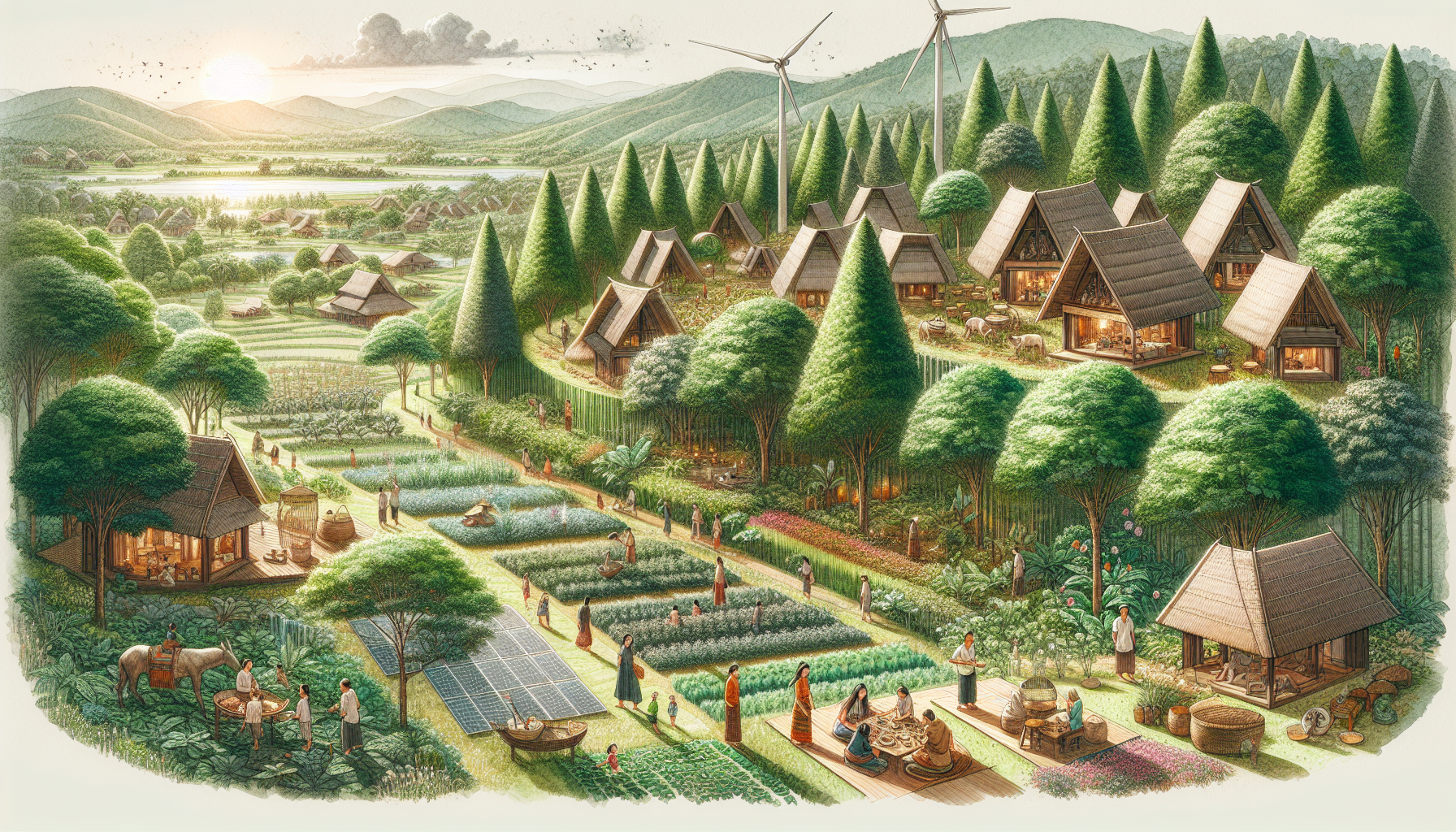
Ecofarm Living: Building Sustainable Communities Through Organic Farming
Ecofarms redefine how we grow our food, merging agricultural productivity with environmental stewardship.
As centers of organic and ecological practices, they offer alternatives to chemical-dependent farming, with a clear focus on maintaining nature’s balance.
In this article, we’ll explore ecofarm practices and principles, you’ll uncover what makes them a crucial part of a sustainable future, and productive communities.
Key Takeaways
- Ecofarms prioritize organic practices, fostering soil health, biodiversity, and using waste-derived compost, contrasting with conventional farms that rely heavily on chemicals and intensive land use.
- The global impact of ecofarming extends beyond environmental benefits, such as reduced emissions and pollution, to improving public health, local economies, and promoting sustainable food systems.
- Technological innovations in ecofarming, including energy management and renewable energy sources, enhance efficiency and promote sustainable and organic agricultural practices.
Understanding Ecofarms
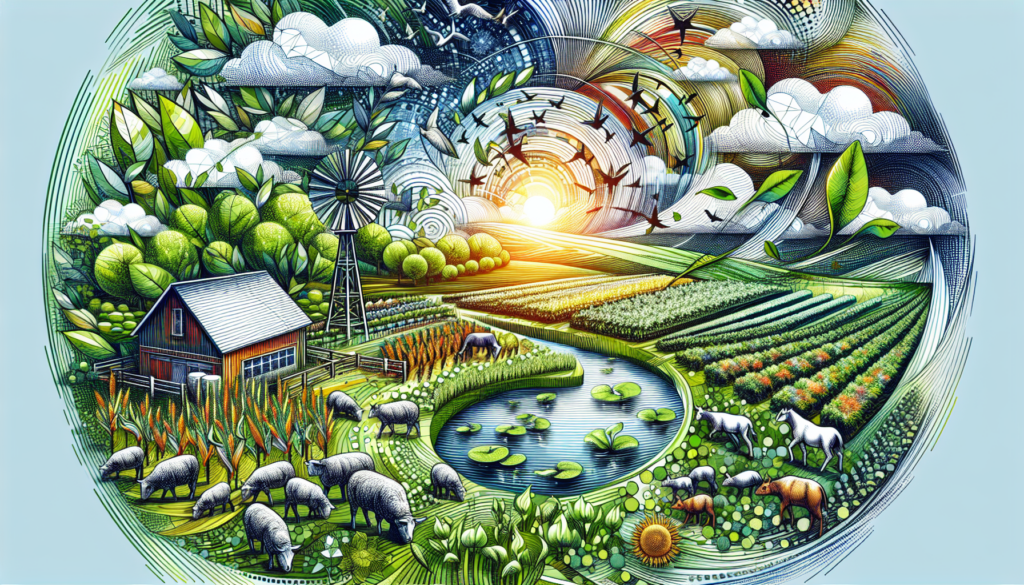

You might think “Ecofarms” being the latest buzzword without much weight behind them. This couldn’t be further from the truth.
Ecofarms do more than just provide food; they support vibrant ecosystems that uphold the values of organic living and ecology. At their core, ecofarms:
- Eschew toxic materials
- Prioritize soil health
- Champion biodiversity
- Make use of waste-derived compost to sustain their crops
This agricultural philosophy, also known known as ecological farming or ecofarming for short, is a testament to the delicate balance that must be maintained in nature, avoiding harmful substances that jeopardize this equilibrium.
The contrast with conventional farms is stark, as traditional methods often lean heavily on chemical usage and intensive land utilization, which can lead to a higher environmental impact.
Innovative methods are at the heart of ecofarming, intertwining scientific research with age-old wisdom to ensure the vitality of the entire ecosystem.
This approach is not merely an alternative to conventional agriculture; it is a revolution, redefining how we think about food systems, farms, and our place within the ecology. By choosing this path, ecofarms contribute to a sustainable future, one where harmony with nature isn’t just an ideal, but a practical reality.
The Global Impact of Ecofarming
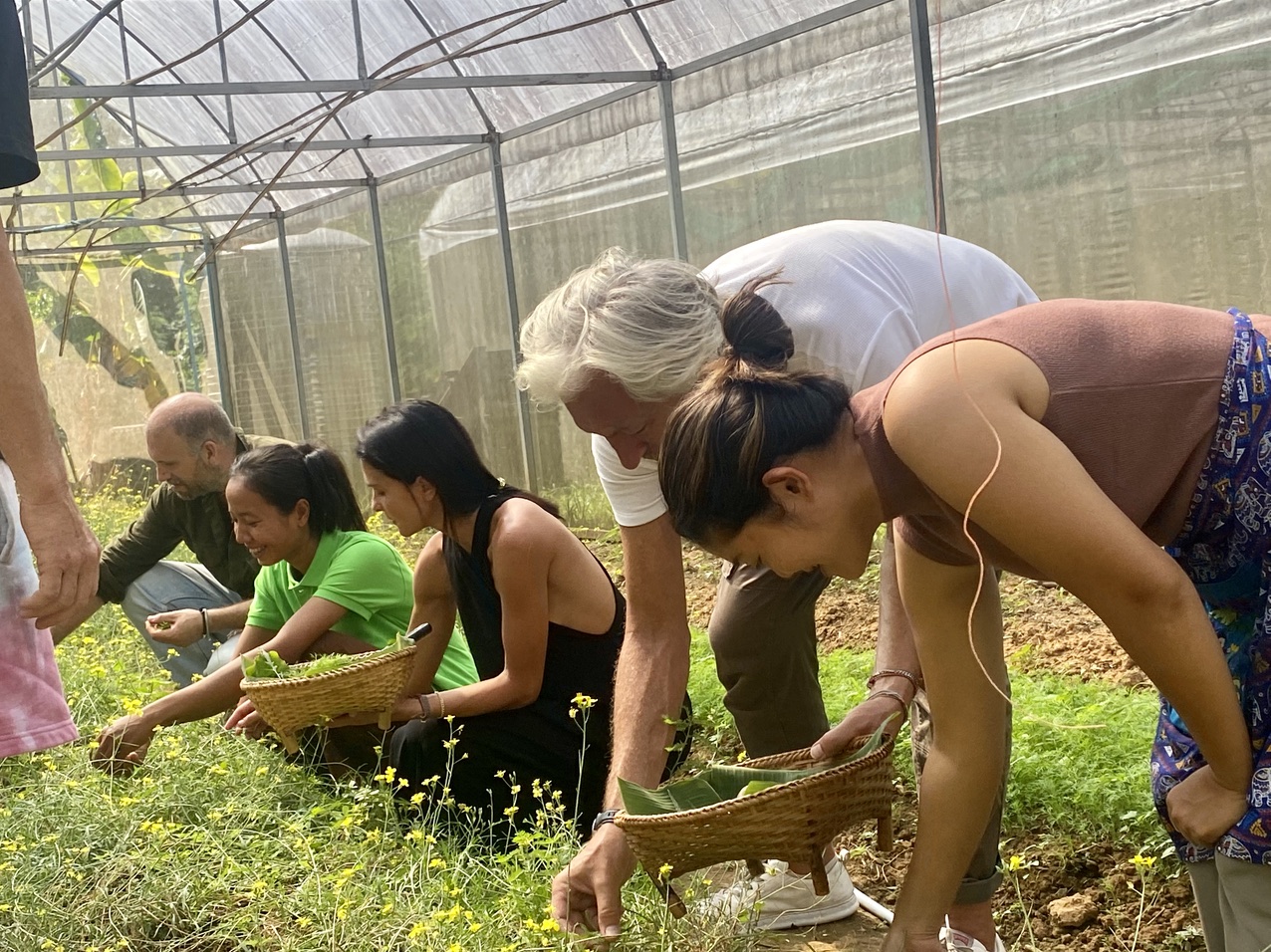

The ripple effect of ecofarming on our planet is profound. By significantly reducing the environmental harm through lowered carbon dioxide emissions and pollution, ecofarms are front-runners in the battle against the greenhouse effect.
They seek to change the attitude towards the traditional farm as not just a source of food but custodians of the earth, fostering food systems that feed us without feeding the problem of climate change.
This philosophy seeps from the ecology into the very well-being of our communities. By minimizing synthetic fertilizers and pesticides, ecofarms produce nutrient-rich crops, contributing to improved public health.
The presence of ecofarms also has a tangible impact on local economies, often increasing household incomes and decreasing poverty levels, particularly in areas where organic farming is embraced. The shift away from synthetic inputs not only fosters greater operational efficiency but also leads to lower farming costs, a win-win for both the environment and the farmer.
The trend towards ecofarming is growing, with nearly one-third of the world’s farms adopting eco-friendly practices since 2018, a clear indication of its increasing significance in the realm of global agriculture.
The Science and Art of Organic Gardening
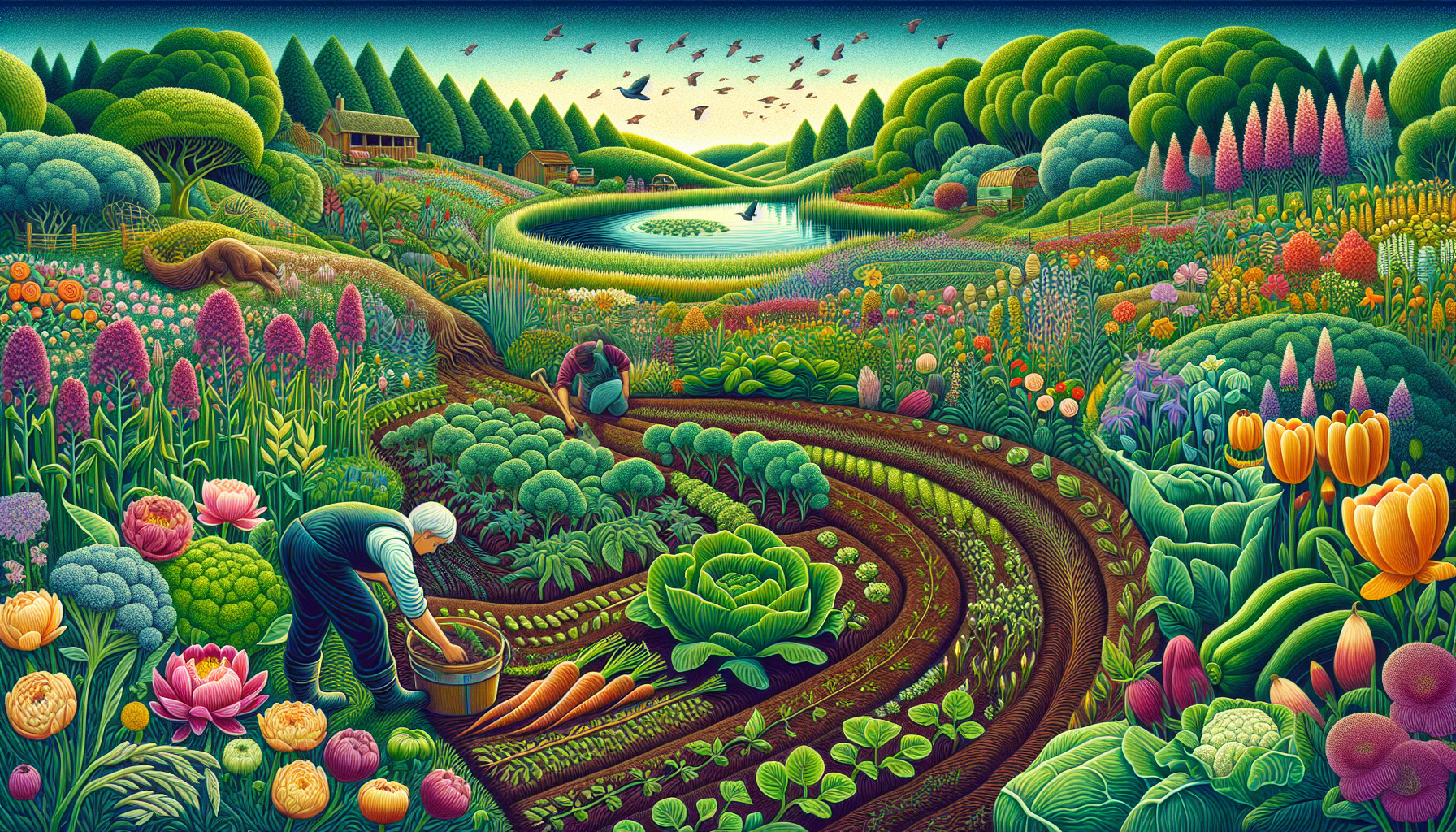

The make-up of organic gardening begins with:
- health
- ecology
- fairness
- care
Each one represents a commitment to fostering the well-being of not just the soil and plants but also the animals, humans, and the planet as a whole.
When it comes to organic farming, the garden becomes a living laboratory, a place of learning where ecological systems and cycles are emulated to achieve sustainability. The foods nurtured within these gardens are free from synthetic additives and chemical pesticides, offering healthier choices to our tables.
Then at the heart of organic gardening lies:
- The conservation of indigenous seeds, adapted to local climates and crucial for food security and life sustenance
- The use of naturally derived plant food, such as banana peels as fertilizer
- Passing on cost-effective and sustainable gardening methods to the next generation
- Farmworkers, pivotal in adopting organic methods, contributing to healthier soils and aiding in climate change mitigation through increased carbon sequestration
It’s this symbiosis where every living element thrives, guided by the principles of organic agriculture that espouse fairness and intergenerational equity.
Ecofarm Technology: Innovations for Efficiency
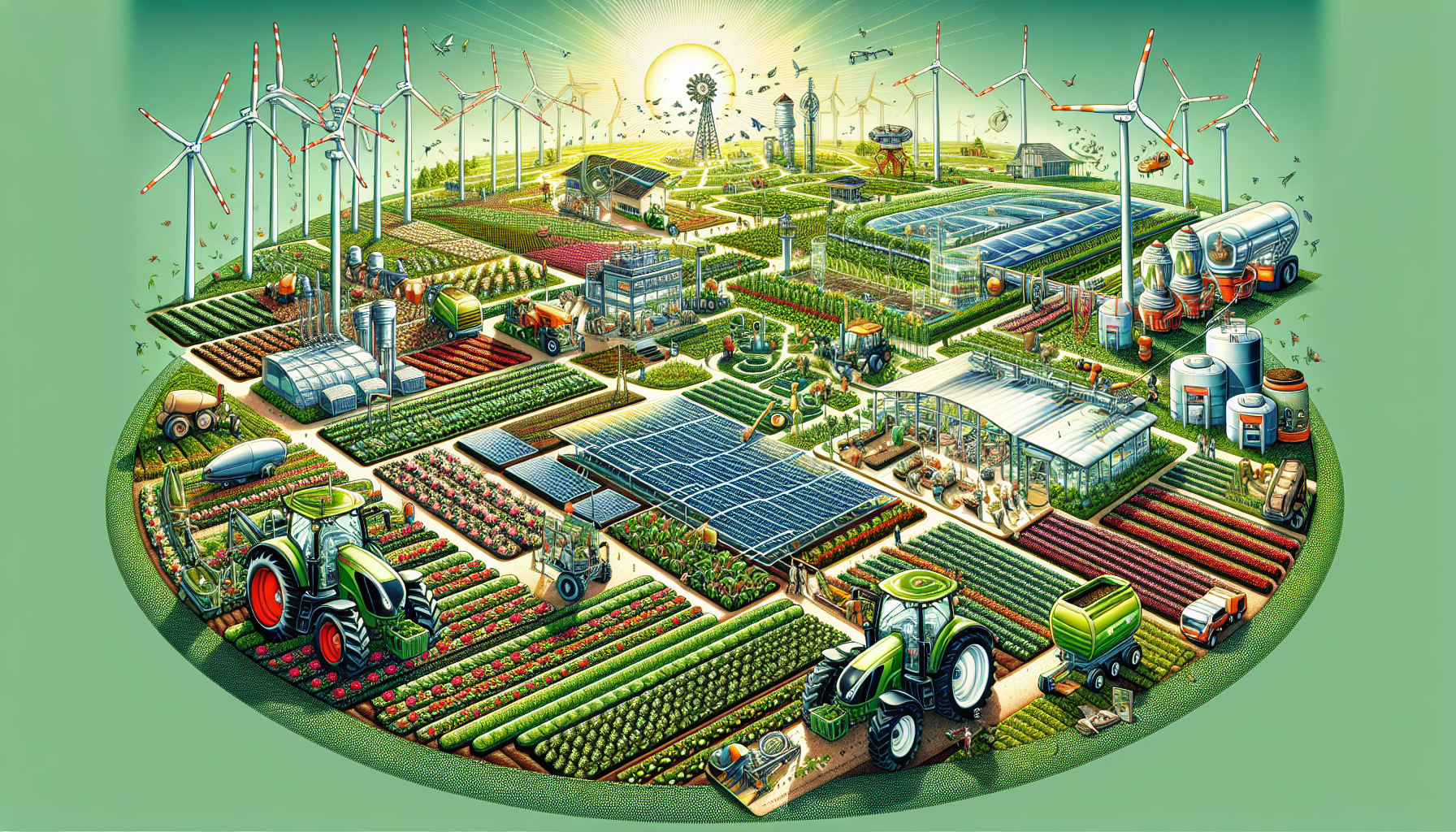

The fusion of technology with ecofarming is reshaping the agricultural landscape.
Energy management systems and renewable energy sources, such as solar power, are becoming increasingly integrated into the organic farming infrastructure. These advancements symbolize a commitment to ecofarming that is not only organic in its approach to crops but also in its energy consumption.
Technology also plays a pivotal role in enhancing animal welfare and reducing resource consumption through improved barn constructions and robotic milking technology.
Innovative growing methods are another cornerstone of eco farm technology. Techniques like hydroponic gardens and vertical gardening optimize space and energy use, while efficient irrigation systems ensure that every drop of water is put to good use.
Empowering farmers with technologies that align with eco-friendly approaches is a step towards reducing the carbon footprint of agriculture, contributing to a food system that is mindful of its ecological impact.
From Seed to Table: The Ecofarm Food Cycle
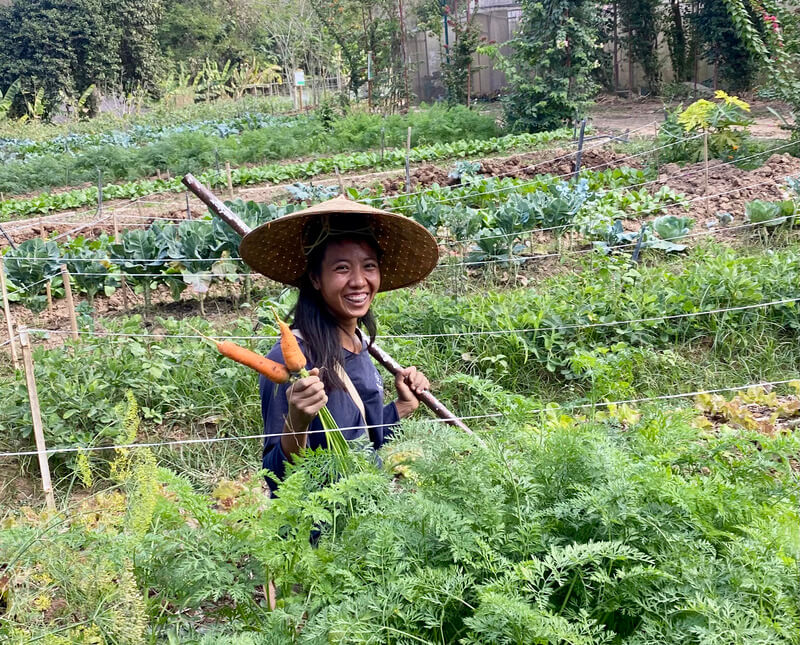

The journey from seed to table in an ecofarm is a cycle steeped in sustainability and respect for the ecology. It’s a food system that emphasizes local sourcing, reducing waste, and ensuring that the food we consume is as healthy for the planet as it is for us.
At The Namkhan, 85% of the food served is sourced locally, bolstering the local economy and minimizing the ecological footprint. The ‘Grow Your Own’ (GYO) movement is gaining traction, providing fresh produce directly from the farm, bypassing the need for plastic packaging, and celebrating the very essence of organic living.
Becoming Stewards of the Land
A pillar of ecofarming is the ethos of stewardship, a dedication to conserving the ecology for future generations.
By adopting eco-friendly practices in one’s garden, such as avoiding chemical pesticides and embracing no-dig gardening, we can foster healthier soils and protect local fauna. These practices contribute to the development of ecosystems that are resilient to environmental changes and beneficial to wildlife, embodying the concept of living in harmony with nature.
Resource conservation is another aspect of this stewardship.
Practices like rainwater harvesting and composting kitchen scraps are practical steps that individuals can take to support environmental sustainability.
By repurposing materials and reducing waste, we not only become stewards of the land but also agents of change, who contribute to a healthier planet for the years to come.
Time-Honored Traditions and Modern Ecofarm Techniques
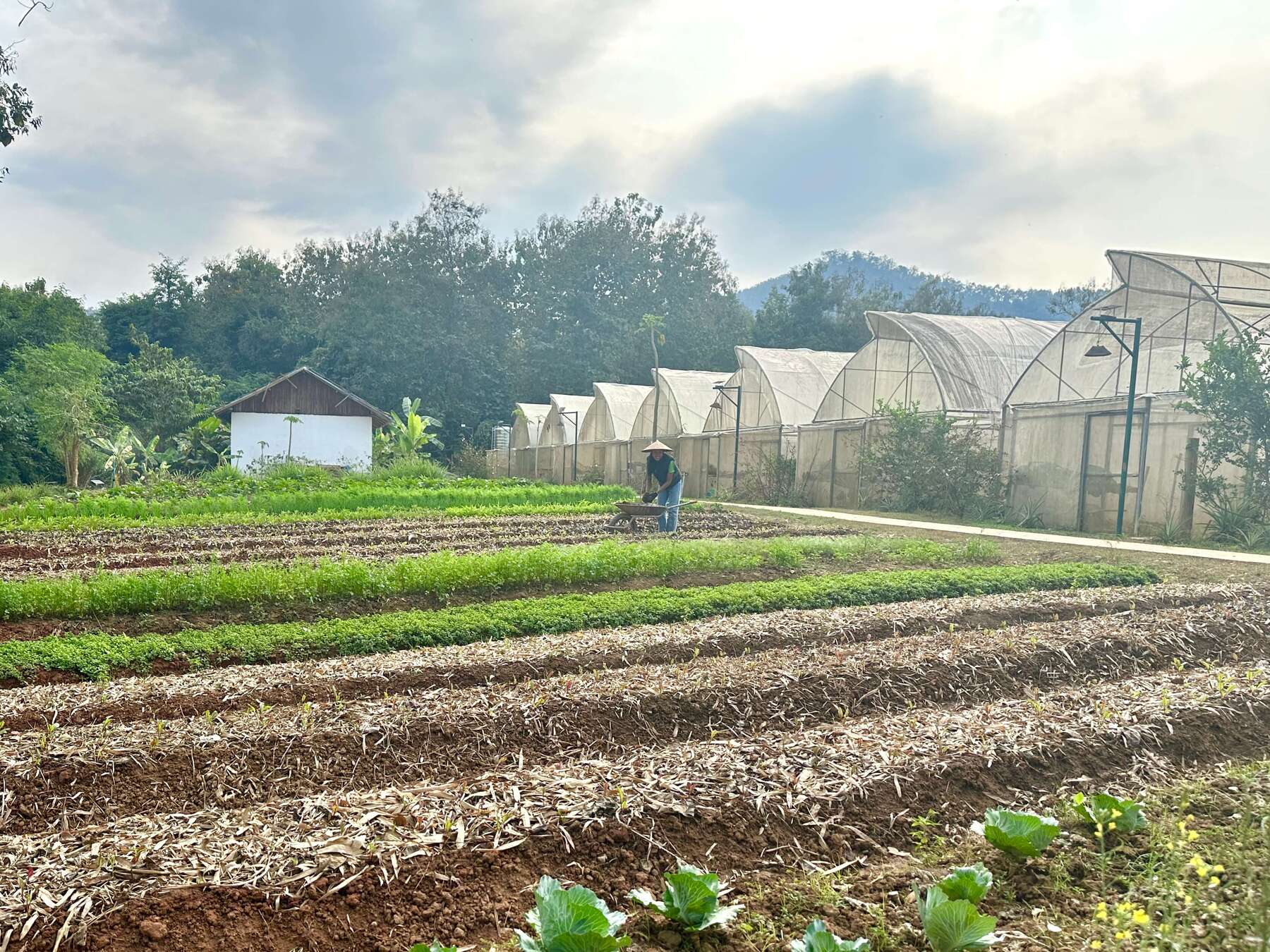

Ecofarming is a unique blend of the old and the new, where time-honored traditions meet modern techniques to address environmental challenges.
The Namkhan Eco Farm, for instance, merges contemporary organic farming research with the preservation of traditional Lao permaculture practices. This synthesis of knowledge not only improves organic farming but also provides a proactive response to issues like climate change.
Traditional farming practices, with their reliance on long-established customs, local knowledge, and simple tools, maintain a low environmental impact while nurturing the ecology.
In combining these age-old methods with current innovations, ecofarms create a food system that honors cultural heritage while being equipped for progress.
It is a testament to the power of organic practices and natural pest control, which, when paired with modern advancements, lead to a sustainable and mindful approach to agriculture.
The People Behind the Plants: Farming Communities
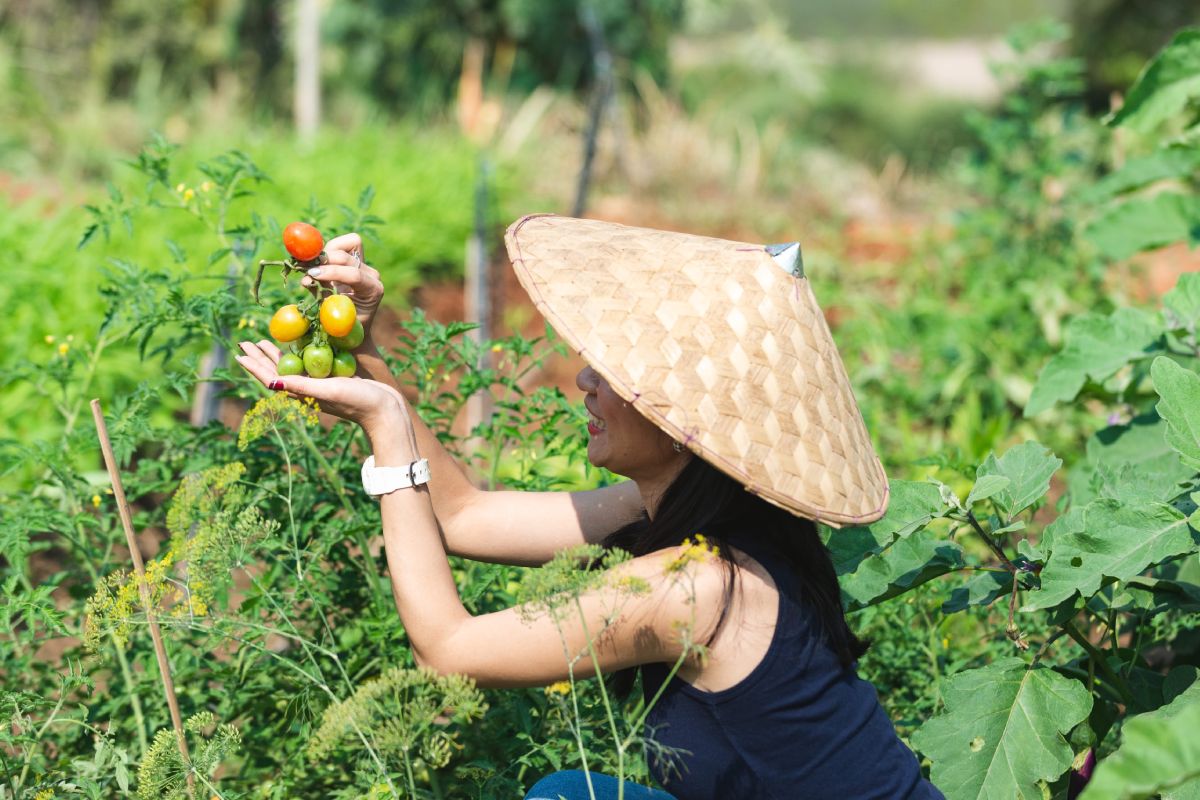

Behind every thriving eco farm, there’s a community of passionate individuals.
These are the people behind the plants, the farmers and workers whose expertise ensures balanced ecosystems and the success of sustainable food systems. The collective efforts of these individuals create job opportunities in rural areas and utilize local resources in food processing, reinforcing the ecofarm food cycle and contributing to the vibrancy of local economies.
Furthermore, ecofarms act as ecosystems in their own right, with each component complementing the other to create a harmonious whole. It’s a collaborative effort that not only yields food but also fosters a sense of community and belonging, reinforcing the human connection to the land and the bounty it provides.
Expanding Environmental Responsibility: The Namkhan Ecofarm
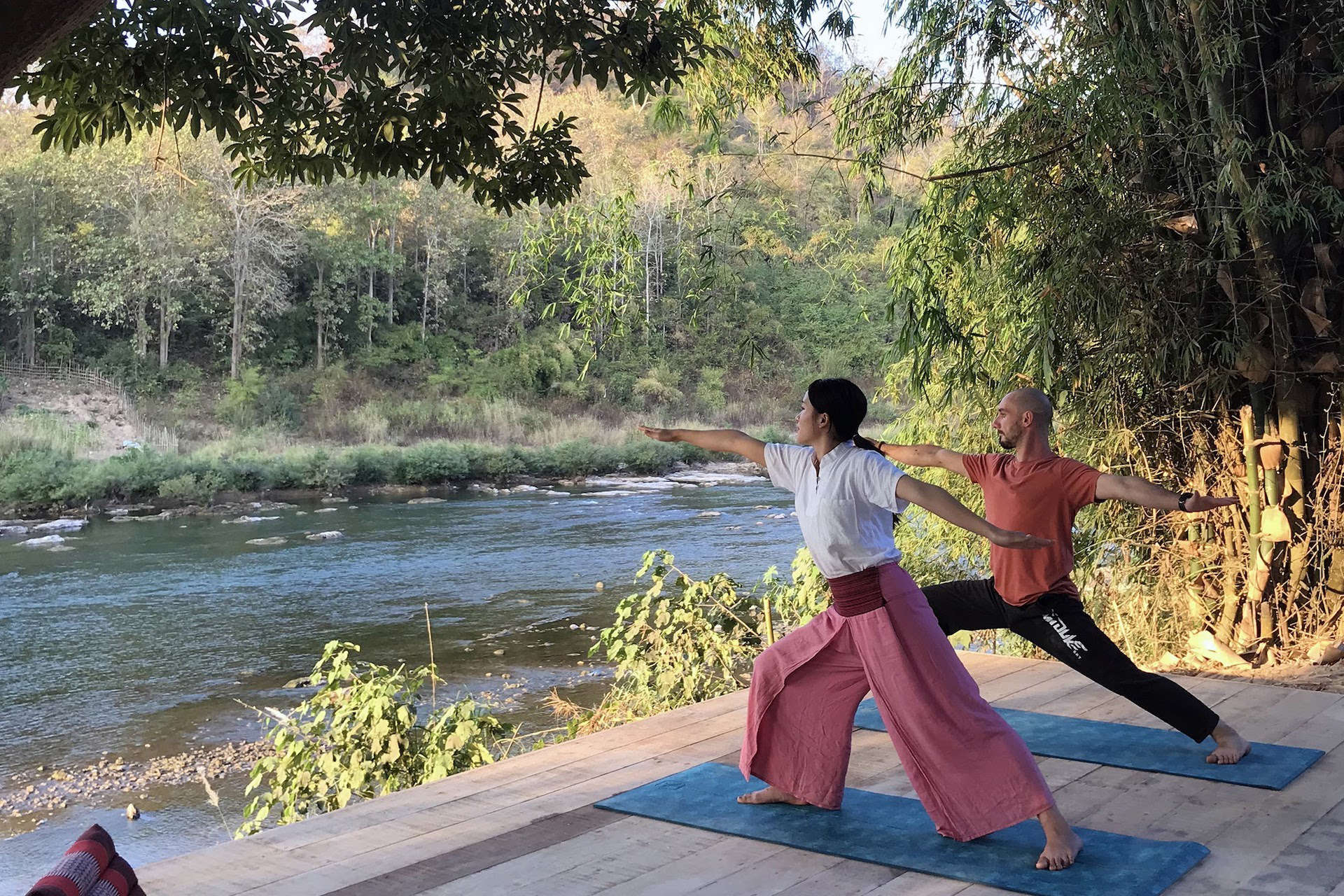

The Namkhan Ecofarm offers:
- Tranquility of serene river views from the comfort of suites or glamping tents
- Nestled in the heart of nature
- Immersive cultural experience that delves deep into Lao traditions
- Lush green sanctuary
Guests at The Namkhan are also invited to indulge in wellness activities, such as spa treatments, yoga, and Qi Gong sessions, all contributing to a holistic approach to relaxation and rejuvenation.
It is a place where luxury and environmental conscientiousness converge, providing a memorable stay that resonates with the soul and reminds us of the importance of preserving our delicate ecology.
A Closer Look at The Namkhan’s Community Role


The Namkhan Ecofarm’s commitment to sustainability and local communities extends beyond the boundaries of its lush fields.
Following five years of successful operation, a portion of its revenue is allocated to enhancing environmental education at the local school, exemplifying the ecofarm’s dedication to nurturing future generations.
By involving local communities in the creation and management of sustainable agricultural systems, The Namkhan builds social capital and ensures fair practices, fostering a sense of unity and shared responsibility.
This commitment is shown as tangible investments, such as:
- The construction of a community center linked to the long-term conservation of nearby forests
- Disseminating information about the ecofarm’s activities and its positive impact
- Reinforcing the importance of environmental education and community involvement
These actions ensure that the message of sustainability resonates far and wide.
Participate and Learn: Visitor Involvement at The Namkhan
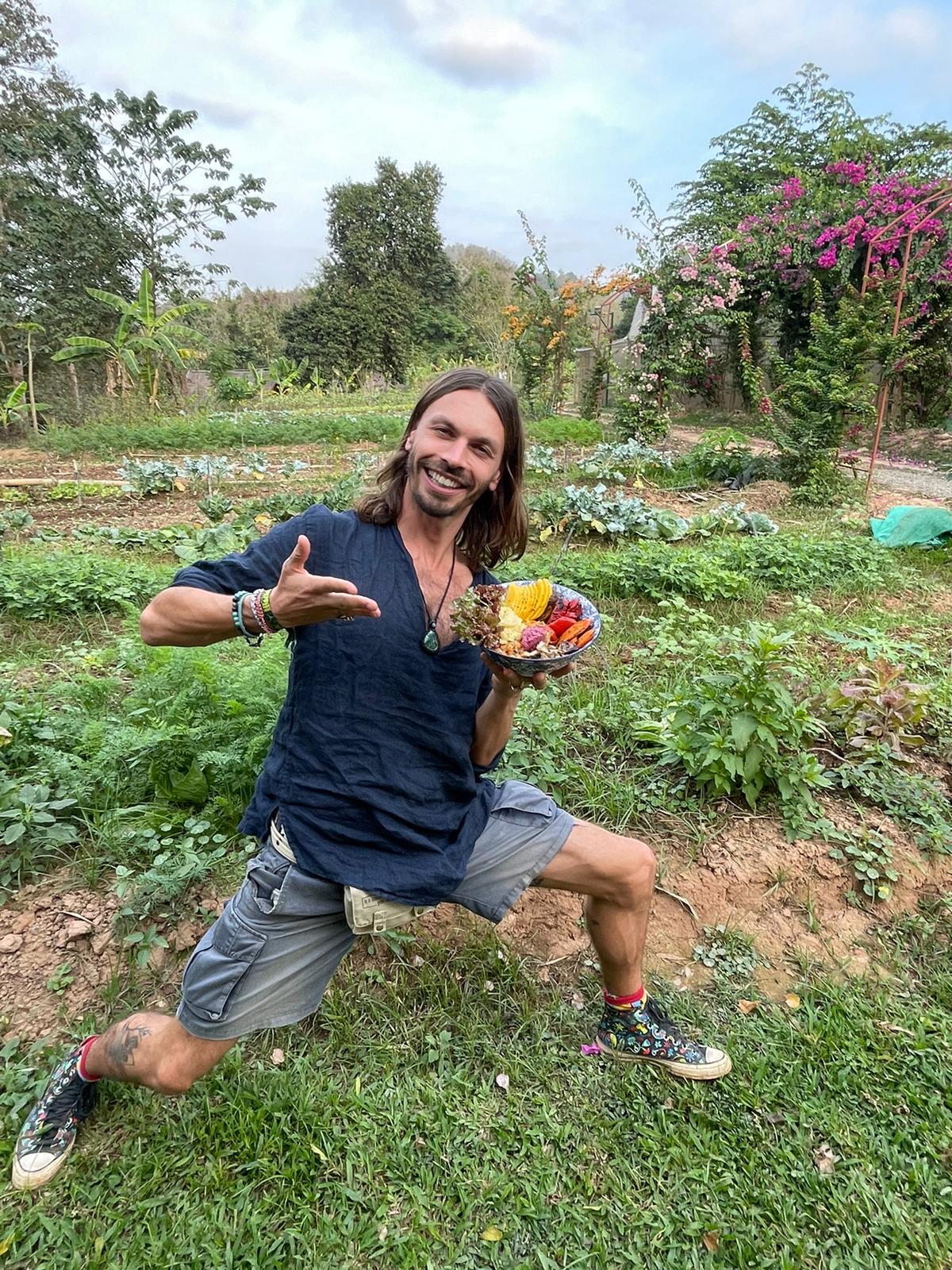

At The Namkhan Ecofarm, visitors are encouraged to roll up their sleeves and dive into the world of organic farming.
A range of agricultural activities awaits, offering guests the chance to connect with the land and learn the intricacies of eco-farming firsthand. Whether tending to a variety of animals at the mini farm or experiencing the changing rhythms of farm life with the seasons, there is a deep sense of connection and understanding to be gained.
The educational programs at The Namkhan complement these hands-on activities, enriching visitors’ knowledge of organic farming and sustainable practices.
It’s an opportunity for guests to not only participate in the eco farm’s daily life but also to carry with them invaluable lessons in living more sustainably.
The Wellness Journey at The Namkhan Resort


Nestled within The Namkhan Resort lies our Wellness Spa, a haven for those seeking health and serenity. After a day of exploring or participating in farm activities, guests can unwind with a variety of therapies that focus on relaxation and connecting with the spiritual essence of Luang Prabang.
The newly renovated Jungle Spa offers a unique and rejuvenating experience, with the following features:
- Finnish Sauna
- Jungle enclosed showers
- Waterfall
- Rock pool filled with fresh underground water
The spa’s professional therapists are on hand and easy to book providing healing treatments daily, ensuring that guests can always find time for self-care during their stay.
Additionally, the tranquil setting by the Nam Khan River offers the perfect backdrop for yoga and Qi Gong retreats, where guests can engage in these practices in a peaceful environment.
Luxurious Living with an Eco-Conscious Twist


The Namkhan Resort redefines luxury, merging it seamlessly with an eco-conscious ethos that is apparent in every detail of the guest experience.
Known for its unparalleled luxury in the heart of Laos, the resort offers guests a choice between refined comfort in luxurious suites and the unique experience of eco-friendly glamping tents, both designed with serene river views in mind.
The accommodations at The Namkhan are crafted to meld luxury with eco-conscious living, providing guests with:
- A peaceful retreat by the river
- A deep immersion in nature
- A living space that inspires love and respect for the environment through its harmony with the surrounding ecology
- An ambiance that is both indulgent and mindful
Adventure and Relaxation: Activities at Namkhan
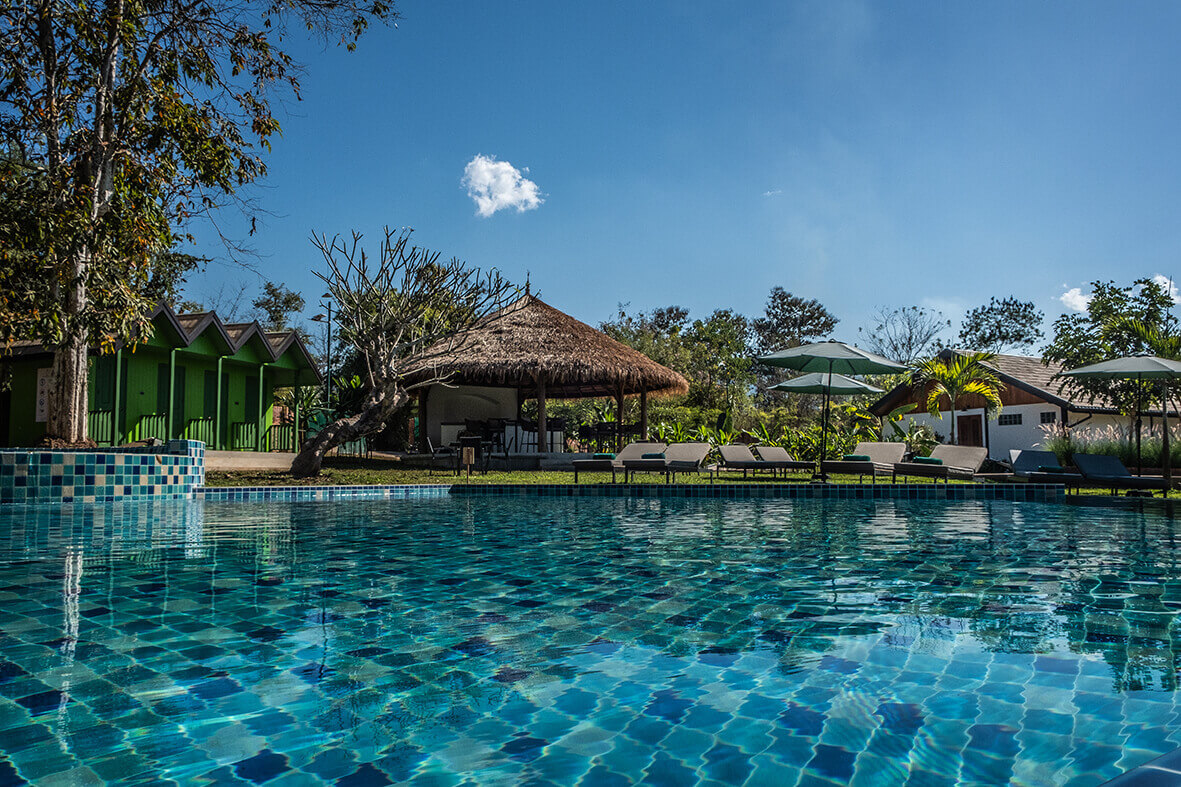

Adventure and relaxation coalesce at The Namkhan Ecofarm, where an array of activities is designed to captivate and soothe the senses.
A central attraction is the infinity pool, equipped with hydro massage cascades, set within a lush tropical garden and complemented by a bar for guests to enjoy their favorite drinks. It’s a place to unwind, soak in the sun, and revel in the beauty of nature.
For those with a spirit of adventure, the resort offers a sunset boat tour along the Namkhan river, providing a serene close to the day with breathtaking views. Additionally, guests can embark on the iMekong Cruise, a unique riverboat experience that showcases the natural beauty of the Namkhan river, offering a blend of excitement and tranquility.
Exclusive Offers for an Unforgettable Stay
To further enhance the guest experience, The Namkhan Resort extends exclusive offers that promise an unforgettable stay.
Among these is the Stay 3 Pay 2 Promotion, which encourages guests to linger longer and fully immerse themselves in the resort’s many amenities by offering a complimentary third night with a two-night booking.
For those seeking an elevated dining journey, the Royal Food Add On provides a 2-4 day culinary adventure, showcasing the best of local and organic cuisine.
The Namkhan Eco Farm: Unifying food science with health education
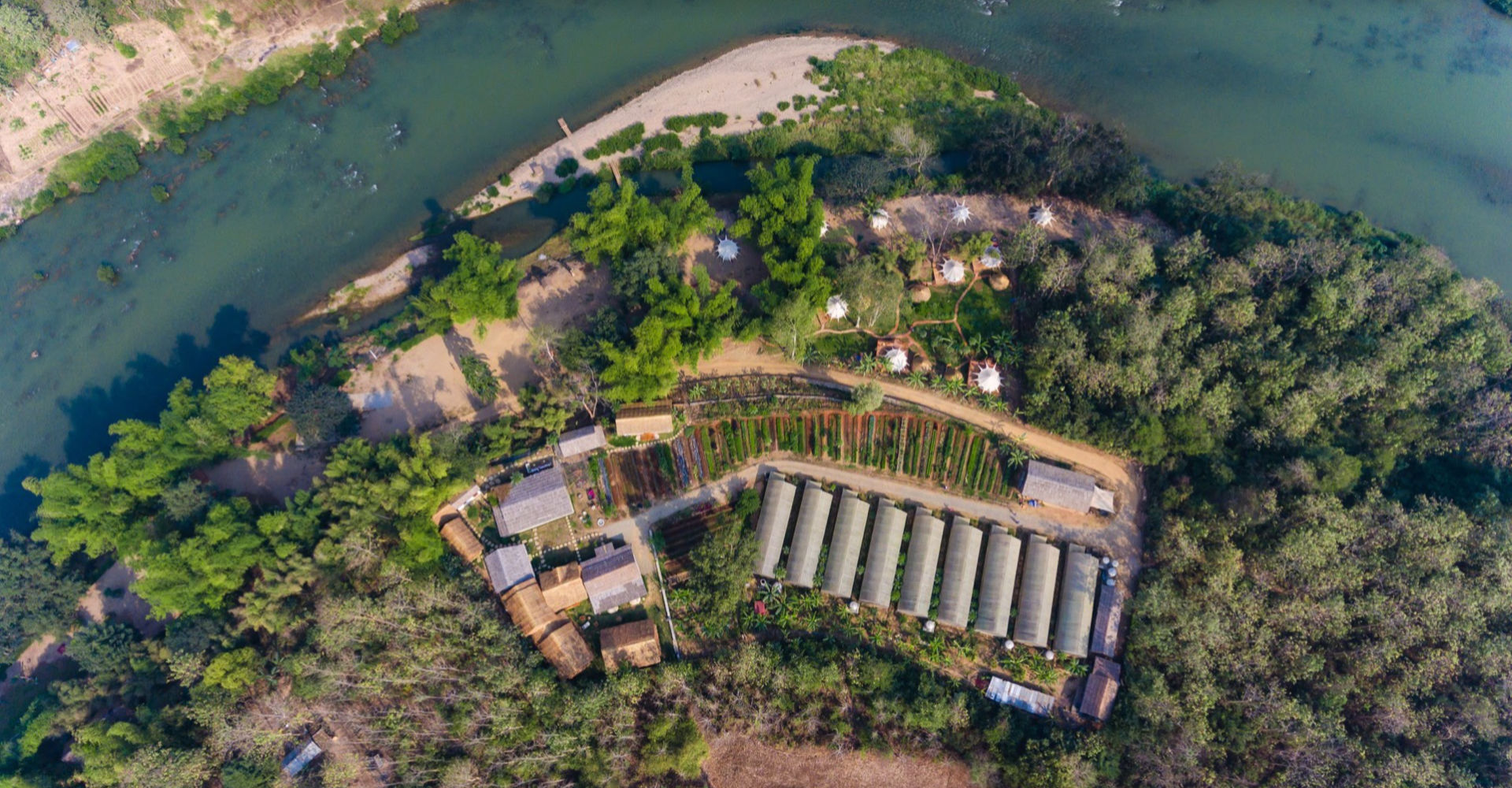

The Namkhan Ecofarm and Resort, with its dedication to sustainable living, ecological farming, and community involvement, stands as a shining example of what it means to harmonize luxury and environmental responsibility.
From the organic principles that guide its farming practices to the luxurious accommodations that welcome guests from around the world, The Namkhan offers an experience that is both enriching and transformative.
As we reflect on the journey through the lush gardens and serene spaces of The Namkhan, let us carry forward the inspiration to cultivate our own lives in a way that honors the land, supports our communities, and upholds the principles of eco-conscious living.
Frequently Asked Questions
What is an ecofarm?
An ecofarm is a sustainable farming operation that prioritizes ecological balance and avoids harmful chemicals to maintain a healthy ecosystem. It uses innovative methods for farming.
How does ecofarming contribute to global environmental health?
Ecofarming contributes to global environmental health by reducing carbon dioxide emissions, pollution, and energy consumption, promoting healthier crops and public health, and building stronger local economies with reduced dependence on synthetic inputs.
What wellness facilities does The Namkhan Resort offer?
The Namkhan Resort offers a Jungle Spa with a Finnish Sauna and rock pool, and yoga and Qi Gong sessions by the Nam Khan River. These facilities cater to different aspects of wellness, providing a variety of options for guests seeking relaxation and rejuvenation.
Can visitors participate in farming activities at The Namkhan Ecofarm?
Yes, visitors can participate in farming activities at The Namkhan Ecofarm, including hands-on experiences and educational programs, to learn about organic farming and farm life.
What exclusive offers are available at The Namkhan Resort?
At The Namkhan Resort, you can enjoy exclusive promotions like the Stay 3 Pay 2 Promotion, well-being add-ons, and a culinary adventure with the Royal Food Add On. Treat yourself to these special offers for a memorable experience.

